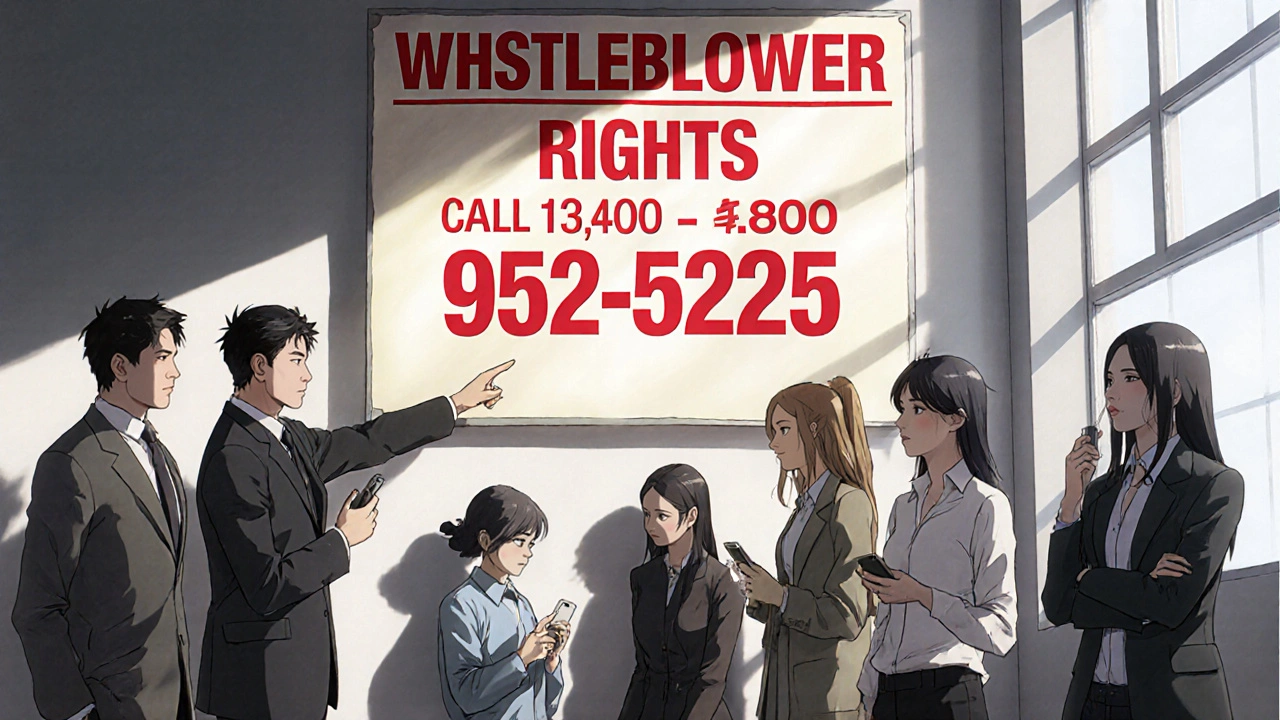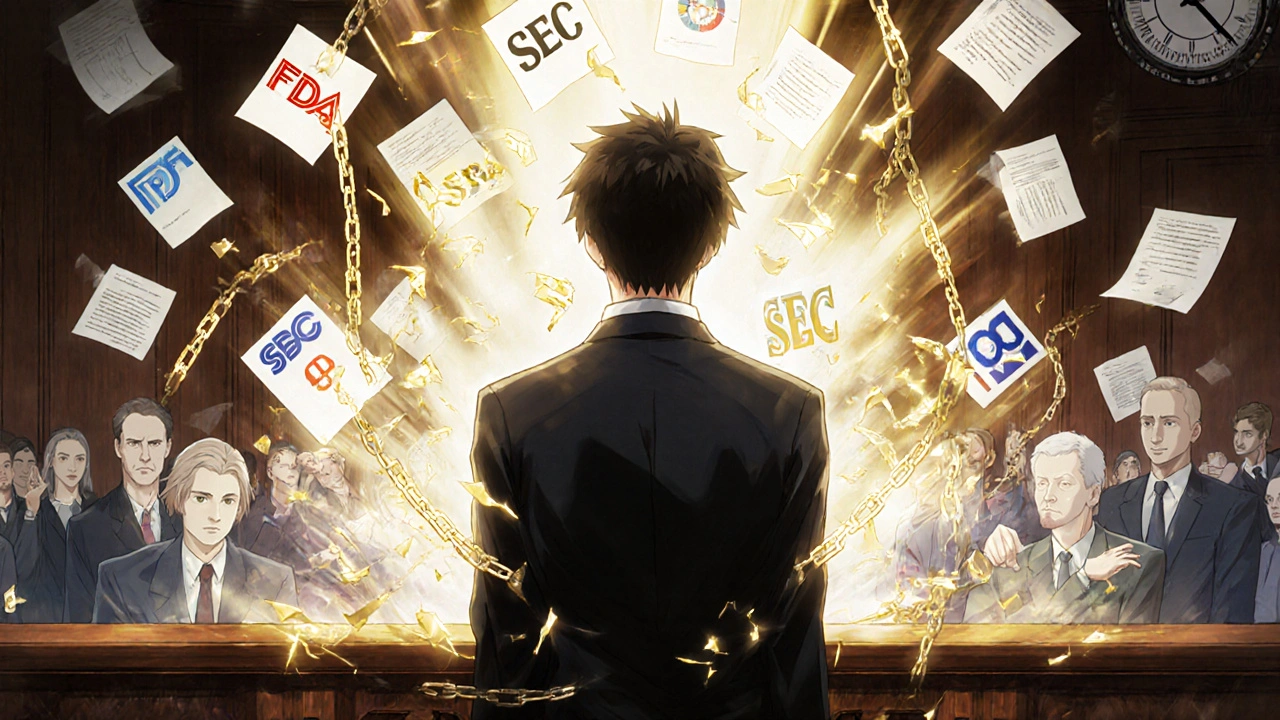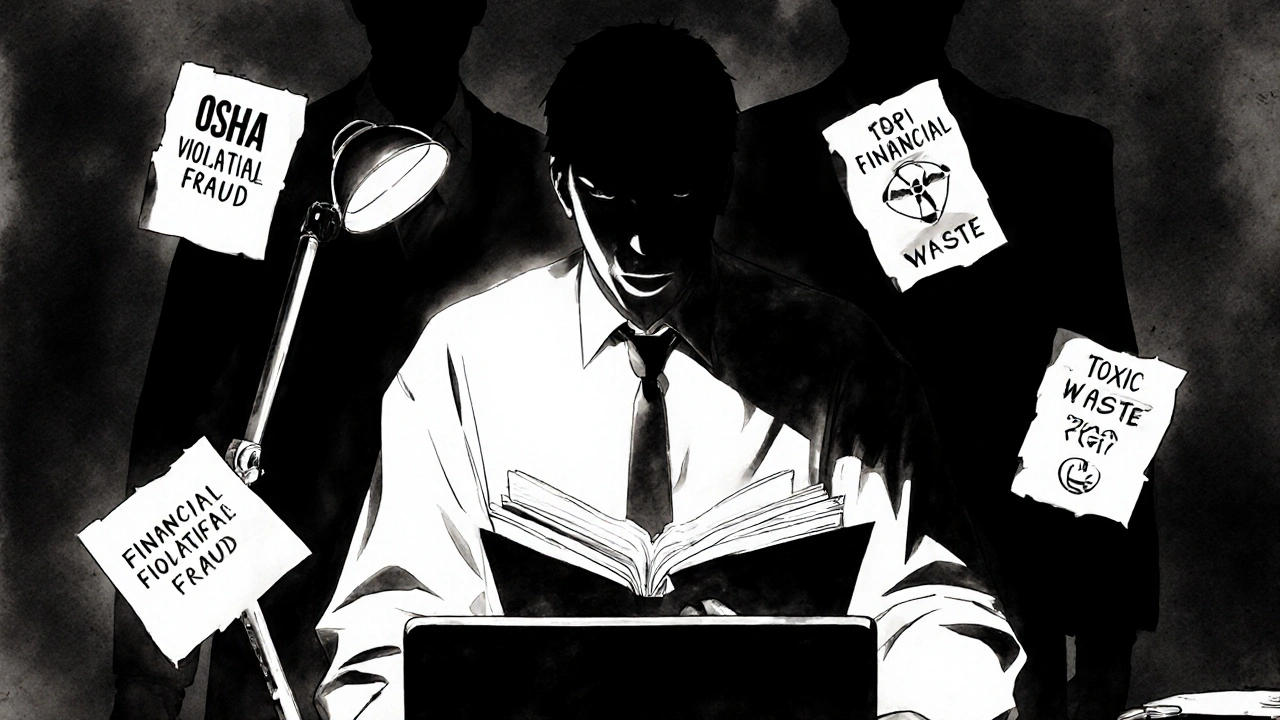Reporting illegal or dangerous behavior at work isn’t just the right thing to do-it’s a legal right. But if you’ve ever thought about speaking up, you’ve probably wondered: What happens if I do? Will I lose my job? Will HR ignore me? Will the system even protect me?
The short answer: it depends. Whistleblower laws exist to shield you from retaliation, but they’re not a magic shield. They’re complex, uneven, and often hard to navigate. In 2025, the rules are changing-especially in California-and knowing exactly what protections you have could mean the difference between keeping your job or being pushed out quietly.
What Counts as Protected Reporting?
You’re protected under whistleblower laws when you report something you reasonably believe is illegal, unsafe, or fraudulent. It doesn’t matter if you’re 100% sure-just that you had a good-faith reason to think it was wrong.
Under California’s Labor Code Section 1102.5, protected reports include telling your boss, HR, or a government agency about violations of state or federal laws. That could mean:
- Reporting unsafe working conditions that violate OSHA rules
- Telling your manager about falsified financial records
- Alerting the EPA about illegal toxic waste dumping
- Notifying the FDA about a drug manufacturer hiding side effects
Even if you report internally-say, to your supervisor-and nothing happens, you’re still protected. You don’t have to go to the police or a regulator first. And it doesn’t matter if you’re a full-time employee, a temp, or even a job applicant who was denied a position after raising concerns.
Federal laws cover specific areas. The Sarbanes-Oxley Act protects employees of public companies who report financial fraud. The False Claims Act covers fraud against government programs like Medicare or defense contracts. The Dodd-Frank Act even offers cash rewards-10% to 30% of the money recovered-if your tip leads to a successful enforcement action over $1 million. But none of these cover everything. That’s why California’s law is broader: it protects reports of any state or federal law violation, not just a narrow list.
What Counts as Retaliation?
Retaliation doesn’t always mean getting fired. Sometimes it’s quieter-and harder to prove.
Protected activities trigger legal consequences if your employer does any of these:
- Terminates your employment
- Reduces your hours or pay
- Denies you a promotion you deserved
- Assigns you to undesirable shifts (like graveyard after reporting safety issues)
- Creates a hostile work environment-constant criticism, exclusion, or sabotage
- Gives you fake poor performance reviews to justify firing you later
One worker on Reddit reported being moved to overnight shifts after reporting OSHA violations. They didn’t get fired-but they were forced to quit. That’s called constructive discharge, and it’s still retaliation under California law.
According to a 2024 survey by the National Whistleblower Center, 68% of whistleblowers experienced some form of retaliation-even with legal protections in place. And 42% said HR told them their complaint “didn’t meet the legal threshold.” That’s often a lie. The law doesn’t require you to prove the violation happened-just that you believed it did.
California’s 2025 Changes: A Major Upgrade
Starting January 1, 2025, California employers must post a clear, visible notice about whistleblower rights in every workplace. The notice must include the Attorney General’s whistleblower hotline: 1-800-952-5225. It has to be in at least 14-point font and placed where employees can easily see it-like break rooms or near time clocks.
Why does this matter? Because many workers don’t know their rights. The California Chamber of Commerce found that 65% of small business owners didn’t even know about this new requirement as of October 2024. The state is forcing awareness-and making it harder for employers to claim ignorance.
There’s also a new penalty: up to $10,000 per violation if an employer retaliates. That’s far higher than most federal penalties. And unlike federal law, California allows workers to sue directly in state court. Federal whistleblowers often have to go through OSHA first, which is slow and inconsistent.
But even California’s law has limits. You can’t sue in federal court under Section 1102.5. And remote workers? The law lets employers email the notice-but doesn’t clarify how remote employees should report safely. That’s a gray area.

Federal vs. State: What’s the Real Difference?
There are 25 federal whistleblower protection laws, each covering different industries and violations. OSHA enforces them all. But here’s the catch: each has its own deadline to file a complaint.
For example:
- 30 days: Clean Air Act, CERCLA (Superfund)
- 90 days: Anti-Money Laundering Act, Asbestos Hazard Act
- 180 days: Consumer Financial Protection Act
Miss the deadline? You lose your case-even if the violation was real. California’s law gives you up to three years to file a claim with the Division of Labor Standards Enforcement (DLSE). That’s a huge advantage.
But federal law has stronger tools in some cases. The SEC’s whistleblower program paid out $637 million to 131 people in 2023. That’s a real incentive. And if you report fraud against the government under the False Claims Act, you could get a cut of the recovered money.
California’s law is broader. Federal laws are more powerful in specific areas. If you’re in finance, federal protections may be your best bet. If you’re in healthcare, retail, or manufacturing in California, state law gives you more room to breathe.
What You Need to Do Before You Speak Up
Whistleblowing isn’t just about courage-it’s about strategy.
First: Document everything. Save emails, texts, performance reviews, shift schedules, and notes from conversations. California’s DLSE requires “clear and convincing evidence” to prove retaliation. Without paper trails, your word alone won’t be enough.
Second: Know your deadlines. If you’re reporting under a federal law, you might have as little as 30 days. Write down the date you reported and the date you were punished. That’s your starting line.
Third: Don’t rely on HR. HR works for the company-not you. They’re trained to minimize risk to the business, not protect you. If you’re worried about retaliation, talk to a lawyer first. The National Whistleblower Center found that 78% of successful cases involved legal representation.
Fourth: Use the right channel. If you’re reporting fraud against the government, go to the DOJ or SEC. If it’s a safety issue, file with OSHA. For California-specific violations, contact the Labor Commissioner’s office. Don’t guess-find the right agency.
And finally: Know your resources. You’re not alone.
- California Attorney General’s Whistleblower Hotline: 1-800-952-5225
- OSHA Whistleblower Program: 1-800-321-6742
- National Whistleblower Center: Offers free legal help to whistleblowers

Why So Many Cases Take Years to Resolve
It’s not just the law that’s slow-it’s the system.
California’s DLSE says the average whistleblower case takes 22 months to resolve. OSHA missed its 90-day investigation deadline in 63% of federal cases in 2024. That’s not a glitch-it’s standard.
During that time, whistleblowers often face financial strain. Many can’t afford to wait for back pay. Some quit. Others take lower-paying jobs just to survive. That’s why legal aid matters so much. Nonprofits like the National Whistleblower Center stepped in for 1,247 people in 2024.
And the delays aren’t just bureaucratic. Employers drag out cases, hoping whistleblowers give up. That’s why having a lawyer early isn’t optional-it’s survival.
What’s Coming Next: AI, Climate, and the Future of Whistleblowing
The laws are catching up to new risks.
In May 2025, Senator Grassley introduced the AI Whistleblower Protection Act. It would protect employees who report misuse of artificial intelligence-like biased hiring algorithms, hidden surveillance, or unethical data use. Right now, there’s no federal law covering this. Workers in tech who speak up about AI harms have no clear legal shield.
Climate reporting is also expanding. More states are considering laws to protect employees who report environmental violations in energy, manufacturing, and transportation. The EU already has a strong whistleblower directive since 2021. The U.S. is playing catch-up.
And the market is responding. The global whistleblower software market is projected to hit $3.45 billion by 2028. Companies are buying tools to handle anonymous reports-not because they care about ethics, but because they’re scared of fines.
One thing’s clear: whistleblower protections are evolving. California leads. The federal government lags. But change is happening-and it’s being driven by people who refused to stay silent.
What If You’re Still Unsure?
You don’t have to decide alone.
Call the California whistleblower hotline. Talk to a nonprofit legal group. Don’t wait until you’re fired. The sooner you understand your rights, the better your chances of staying safe.
Whistleblower laws exist to protect the public-not just the company. If you’re reporting something dangerous, illegal, or unethical, you’re not a traitor. You’re a safeguard. And the law, imperfect as it is, is on your side-if you know how to use it.
Can I be fired for reporting a violation at work?
No, it’s illegal for an employer to fire you for reporting what you reasonably believe is a violation of state or federal law. This is protected under whistleblower laws like California’s Labor Code Section 1102.5 and multiple federal statutes. However, proving retaliation can be difficult without documentation. Employers may try to disguise firing as a performance issue, so keeping detailed records is critical.
Do I need to report to the government first to be protected?
No. You’re protected even if you report internally-like telling your manager or HR. California law explicitly covers reports made to supervisors or coworkers. Federal laws like Sarbanes-Oxley also protect internal reporting. The key is that you must have a reasonable belief that a violation occurred, not proof that it did.
How long do I have to file a whistleblower complaint?
Deadlines vary by law. For California Labor Code Section 1102.5, you have up to three years to file with the Division of Labor Standards Enforcement. For federal laws, deadlines range from 30 days (Clean Air Act) to 180 days (Consumer Financial Protection Act). Missing the deadline means losing your right to pursue the claim, so act quickly and confirm the correct timeframe for your situation.
Can I get paid for reporting fraud?
Yes, under the federal False Claims Act and Dodd-Frank Act, whistleblowers can receive 10% to 30% of the money recovered by the government if their information leads to a successful case. In 2023, the SEC paid out $637 million to 131 whistleblowers. These rewards apply only to fraud involving government funds or securities violations-not general workplace complaints.
What if I’m a remote worker? Do I still have protections?
Yes. California’s whistleblower protections apply to remote workers as long as the employer does business in the state. However, the new 2025 posting requirement only mandates physical notices in workplaces-leaving remote employees without guaranteed access to the notice. Employers must still comply with reporting protections for remote staff, but the lack of clear guidance on digital reporting channels creates uncertainty. Keep all communications in writing and use email to document your reports.
Are there any industries with stronger whistleblower protections?
Yes. Financial services, healthcare, and government contractors have some of the strongest protections due to laws like Sarbanes-Oxley, the False Claims Act, and Dodd-Frank. Airline safety workers are protected under AIR21, though enforcement has gaps. California’s broad labor laws offer strong coverage across all industries, making it one of the most protective states. Technology and AI sectors currently have the weakest protections, which is why new laws like the AI Whistleblower Protection Act are being proposed.


Pravin Manani
November 22 2025California’s 2025 update is a step forward, but the real gap is enforcement. Even with the 10K penalty, employers will still bury complaints under procedural noise-‘restructuring,’ ‘performance alignment,’ ‘cultural fit.’ The law doesn’t mandate third-party oversight of internal HR investigations, which means the fox still guards the henhouse. We need mandatory independent review boards for retaliation claims, not just a hotline number on a poster.
Also, remote workers are being left in the lurch. If the notice requirement is only physical, and the reporting channel isn’t digitized with encrypted submission, then the law is performative for half the workforce. That’s not inclusion-it’s exclusion by design.